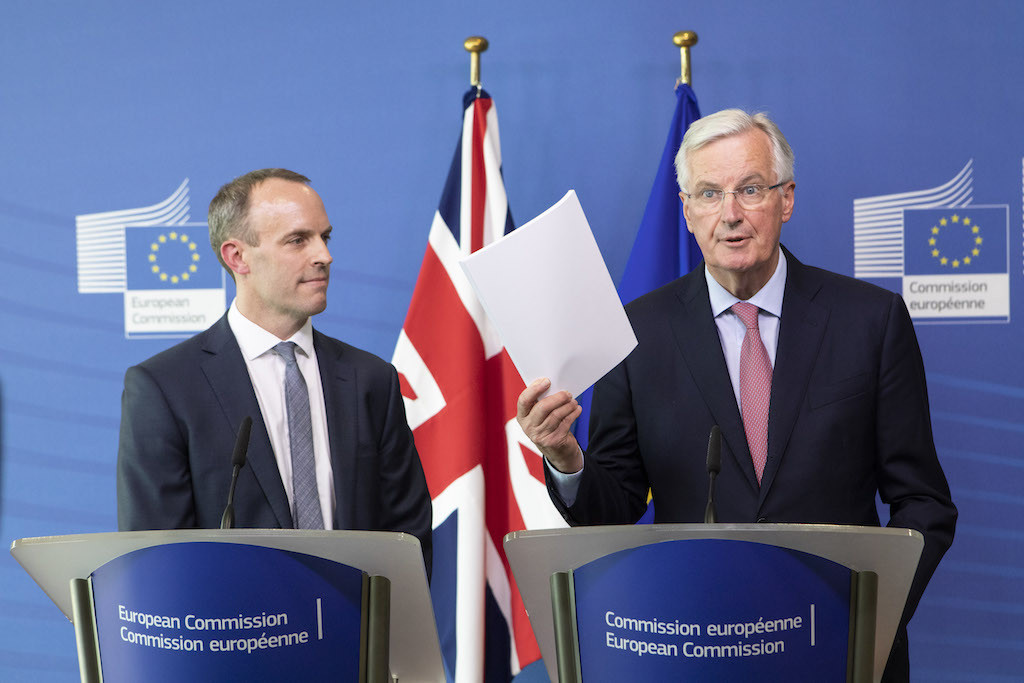The Brexit secretary was confronted by Barnier during their most recent meeting in Brussels over correspondence sent in recent days to EU capitals by the Department for Transport.
The letters had asked the member states to prepare to engage with the British government in side deals on aviation and haulage, to allow key trade flows to continue in the event of the UK and the EU failing to come to an agreement on leaving the union by 29 March 2019.
The transport secretary, Chris Grayling, had ordered the letters to be sent despite being told less than two weeks ago by the European commission’s most senior trade official, Violeta Bulc, that without a deal this autumn, there would be no other agreements made to protect the UK economy.
No deal, no trust
Barnier is said to have reiterated that message to Raab, telling the cabinet minister: “If there is no deal, there is no trust.”
The bruising exchange came on the same day that Theresa May told cabinet members the UK should remain “the EU’s closest ally” after Brexit, amid a growing belief in Downing Street that progress is gradually being made in the long-running divorce talks.
The prime minister told ministers on Tuesday that she would travel to Salzburg, Austria, for an informal EU council meeting next Wednesday, where she is expected to briefly address other leaders over dinner in an attempt to sell the idea of a deal based on her Chequers proposals.
Downing Street is setting a low bar for success at Salzburg in the belief that the most important thing at this stage is that Chequers is not ruled out. Salzburg would be “a staging post in exit negotiations”, her spokesman said in a briefing for reporters.
The spokesman added that May told the cabinet that she hoped to “build on the constructive engagement of the summer” by “underlining the importance to both parties of remaining the EU’s closest ally” after Brexit.
No 10 has become cautiously hopeful that a Chequers-style deal has a chance of success, trusting that the divorce talks will ultimately come down to an intense period of last-minute negotiating in the runup to a final Brexit summit expected in the middle of November.
Public position softened
Officials believe that Barnier has softened his public position in the last few days. Last week Barnier reportedly told a delegation of British MPs from the Brexit select committee that he believed Chequers was “dead”, because it would require the European Union to compromise on fundamental principles on the operation of the single market.
But on Tuesday Barnier said it was “realistic” to believe that a Brexit deal can be agreed between the UK and the EU within the next two months . “If we are realistic, I want to reach an agreement on the first stage of the negotiation, which is the Brexit treaty, within six or eight weeks,” he said.
May’s negotiating plan remains intensely unpopular on the right of her own party. At least 20 MPs have told her to “Chuck Chequers” and propose a Canada-style free trade deal as an alternative.
There is particular unhappiness that the prime minister proposed that the UK share a “common rulebook” for food and goods with the EU after Brexit, which critics say amounts to the UK becoming a “rule-taker” from Brussels.
Debates about whether Chequers is appropriate are expected to dominate the Conservative party conference at the end of the month, which is partly why it remains critical for May to ensure that EU leaders do not summarily reject the proposals at the Salzburg meeting.
May will depart Salzburg early on Thursday, after a morning discussion on chemical weapons, leaving the remaining EU leaders to discuss their reaction to the Chequers plan.
By Daniel Boffey and Dan Sabbagh
